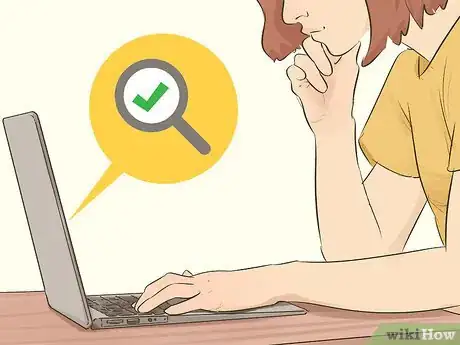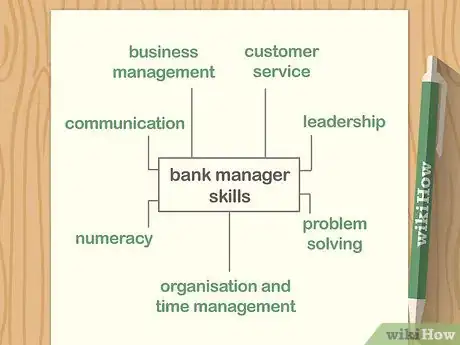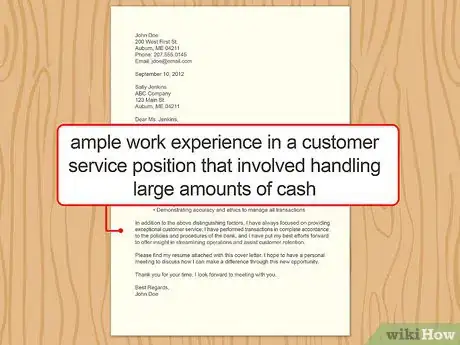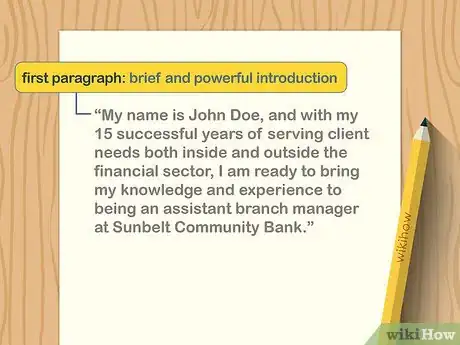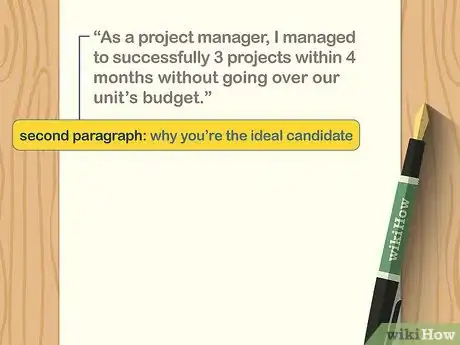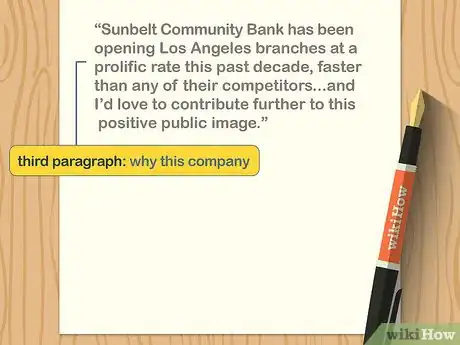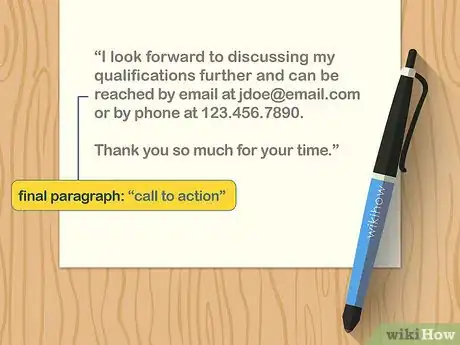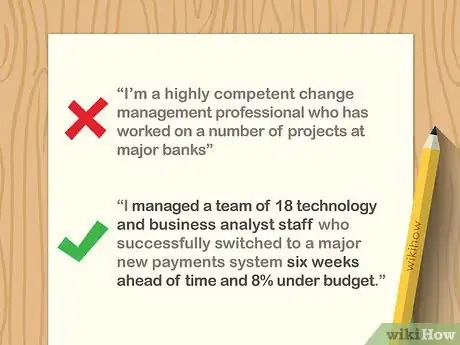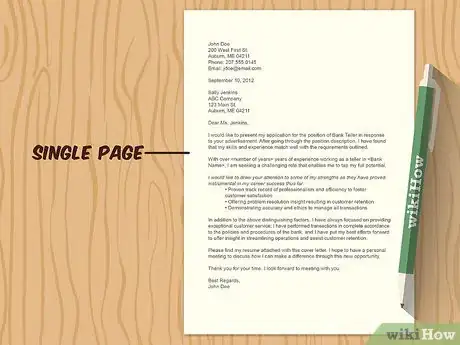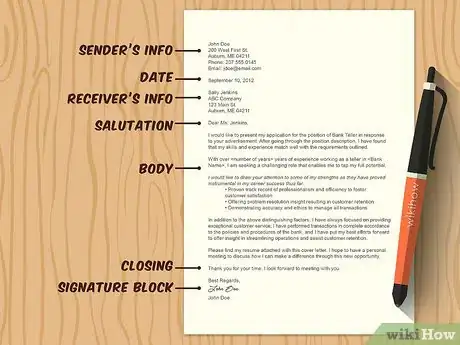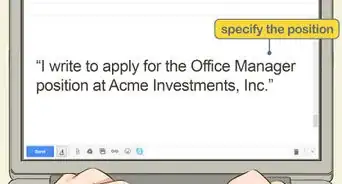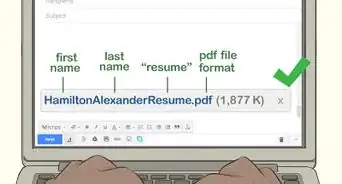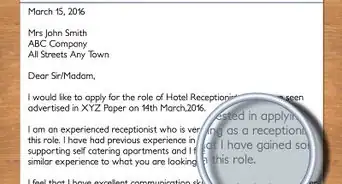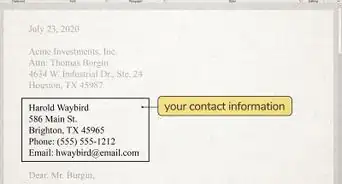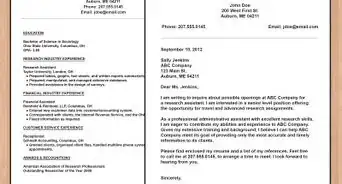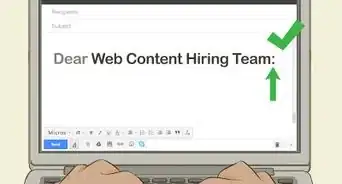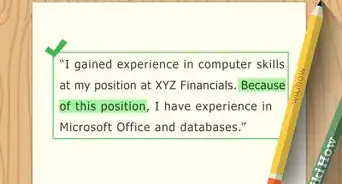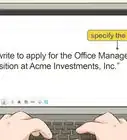This article was co-authored by Kolby Goodman. Kolby Goodman is a Career & Job Search Coach and the Founder of The Job Huntr. With over eight years of experience, he specializes in resume edits, interview preparation, LinkedIn profile feedback, and professional interview coaching. Additionally, his career advice has been featured in publications such as The Huffington Post. Kolby holds a Bachelor’s degree in Economics from San Diego State University.
There are 8 references cited in this article, which can be found at the bottom of the page.
This article has been viewed 128,226 times.
If you are seeking a job in the banking industry, a cover letter is an essential component of your application process. Banks usually skim through large volumes of applications for open positions, so you need to maximize every word of your cover letter to make it stand out. Fortunately, by researching the company and the position, explaining how precisely you would fit both, and organizing and formatting your letter properly, you can increase the odds of your cover letter landing you the banking job of your dreams.
Steps
Gathering Information for Your Letter
-
1Research the company and position. Your cover letter should be tailored to the position you’re applying for, so learn as much about the company as you can to be able to discuss it in your letter. The more information you have and the more specific you can be, the better.
- Study the company’s website closely. Look for anything that makes it distinctive in relation to its peers. Research its business strategy and culture, as well as all of the services it provides.
- For example, if the bank’s website highlights the amount of international clients it has, make a point of mentioning this fact in your cover letter and state that you’re particularly interested in international banking.
- Gather all the details you can about the nature of the position itself. Read the advertisement carefully. Reach out to the contact person on the job ad for more information.
- Whether you’re looking to become a loan officer at your local branch or an investment banker at a national firm, you should expect stiff competition for the job. A generic, cookie-cutter cover letter is unlikely to make the cut.
-
2Consult but don’t rely on cover letter templates. Although it’s easy to find cover letter templates online, in a competitive field like banking and the tight current job market, however, there is no such thing as a one-size-fits-all cover letter. However, consulting a template can help you figure out the best way to structure your cover letter without creating a carbon copy of someone else’s letter.[1]
- For example, you can easily find a template and sample cover letter for a loan officer position online that uses a 3-paragraph format and bullet points to emphasize the most critical information.[2] But this should only provide inspiration for a letter tailored to the precise job you are seeking.
- If you're sending out several applications to different banks, you can use the same rough template. But the heart of your letter, the central paragraph(s), should be specifically tailored to each particular position.
Advertisement -
3Determine what skills or experiences make you a fit for this job.[3] As the person in charge of reading through applications scans over your cover letter, they need to see an immediate, clear explanation of why you are the right one for the job. Therefore, you need to figure out the answer to this question for yourself so that you’ll be able to articulate it in your cover letter.[4]
- Your letter essentially has to answer several key questions, including: “Who am I?”, “Why do I want this (specific) job?”, “Why should you want me for this (specific) job?”, and “What do I have (attributes, skills, experiences, etc.) that you need?”
- For example, when applying for a banking job, some skills that would make you a particularly strong candidate include communication skills, problem-solving abilities, and cash handling skills.
- If you want to get a job as a bank teller, it can be really helpful to garner some experience in a position that involves customer service and cash handling, such as a salesperson or cashier.
- The goal in the application process and as a job seeker, is to differentiate yourself versus your competition. So, talk about your benefits and explain how that employer can benefit from the skills and the expertise that you bring.[5]
-
4Figure out the key “selling point” for your application. It is tempting to try to stuff your cover letter with every positive achievement and quality you can think of about yourself. However, it’s more effective to organize your cover letter around a focal point: 1 primary factor (skill, experience, quality, etc.) that answers the key questions and makes you a particularly strong contender for the position.[6] [7]
- This may be your academic achievements in relevant coursework; your prior successful experience in the industry; a successful internship with a glowing recommendation; or your relevant experiences in another field.
- For example, if you’re applying for a job as a bank teller, a good factor to emphasize would be your ample work experience in a customer service position that involved handling large amounts of cash.
- Pick the top two or three skill sets that you embody and have mastered to include in the cover letter. Always take it one step further by showcasing how you can leverage those skill sets to have a positive impact on that next employer.[8]
Writing Your Letter
-
1Introduce yourself quickly but powerfully in the first paragraph. It is essential that you let readers know who you are, what position you seek, and why you’d be a good fit for the position in the first few lines of your letter. Conclude this introduction paragraph with a unique reason why you’d be perfect for the job.[9]
- Aim for at most 2-3 sentences for your introduction. Sticking to 35 total words, especially if you must stick with a one-page letter, will also leave ample space for the central paragraph(s).[10] [11]
- “Greetings. My name is Casey Weinberg, and I am applying for a job as an assistant branch manager” is brief but dull. Allow your introduction to introduce not only you, but the central components of your case for being hired: “Greetings. My name is Casey Weinberg, and with my 15 successful years of serving client needs both inside and outside the financial sector, I am ready to bring my knowledge and experience to being an assistant branch manager at Sunbelt Community Bank.”
- If you have any contacts or character references within the company, mention these in your introductory paragraph as well.
-
2Focus on why you’re the ideal candidate in the second paragraph. This paragraph should hone in on the key reason or reason why you’re the exact match for the type of person they’re looking to hire. Include specific examples in this paragraph of the (positive) results and outcomes you’ve achieved in similar jobs or positions in the past.[12]
- An example of describing a positive achievement in a previous job would be: “As a project manager, I managed to successfully 3 projects within 4 months without going over our unit’s budget.”
- Be sure you match your skills and experiences to the specific qualifications listed in the job description. Give the reader a concrete sense of how your past experiences can come to bear in specific ways in this job.
-
3Explain why you want to work for this company in the third paragraph. Don’t just copy a description of the company from its website or from the job posting. Instead, describe in creative detail why you want to work for this particular company instead of another one. As well, describe why this is the type of banking job you want as opposed to some other type of job.[13]
- For example, if this particular banking company is known for producing some of the most successful people in the financial industry, say that you want to work for what is evidently one of the best financial institutions in the business.
- A slight hint of flattery and a lot of research will go a long way in this paragraph. Don’t be afraid to wear your heart on your sleeve when it comes to explaining why you’re seeking a job with this particular company.
-
4Conclude with a “call to action” that invites the reader to contact you. First, reiterate why you’re the ideal candidate for the position. Then, simply end this paragraph with a sentence stating that you would be happy to discuss your candidacy further in an interview and that you look forward to hearing from them.[14]
- Make sure you include your contact information in this paragraph if it isn’t included at the top of your letter. If possible, include multiple different means of getting in touch with you.
- Thank the reader for their time and consideration before concluding the cover letter with “Sincerely, Casey Weinberg.”
Formatting and Editing Your Letter
-
1Refrain from using empty and generic phrases in your letter. Although you may want to say you’re “motivated,” “determined,” or “trustworthy,” these words appear in so many cover letters that the reader won’t see yours as unique if you use them. Instead, use creative and specific language that highlights the concrete skills and experiences you bring to the table.[15]
- Use active phrases that focus on results and outcomes. Make it clear that you have gotten things done in the past and will continue to do so in this new position.
- For instance, consider the differing impact of the following 2 statements: “I’m a highly competent change management professional who has worked on a number of projects at major banks,” versus “I managed a team of 18 technology and business analyst staff who successfully switched to a major new payments system six weeks ahead of time and 8% under budget.”[16]
- The more specific you can be in a limited number of words, the better.
-
2Keep your cover letter to a single page, unless stated otherwise. Some studies indicate that the average cover letter is looked over for only about 15 seconds. Therefore, you need to make an immediate, positive impression with both the look and content of your letter to stand a chance of avoiding the reject pile. Keeping your cover letter to a single page gives the reader the best opportunity to scan it quickly and get the most important information fast.[17]
- Some job postings may list word or page limits for cover letters. You can also ask the contact person if there are any.
- A cover letter is your opportunity to “personalize” your resume. They should complement each other to present a quick yet thorough portrait of you as a strong job candidate. Thus, place the most important information about you near the top of the letter, just as you would with a resume.[18]
-
3Use professional cover letter formatting. Include formal cover letter elements like the address block of the employer on the top left side of the page, a date line underneath it, your own address block at the very top of the page, a formal salutation to start the letter, and a formal signature at the bottom. Write the letter in size 12 Times New Roman or Arial font, unless directed otherwise, and keep the margins of the letter to 1 inch (2.5 cm).[19]
- Refrain from using bold fonts or colors; although these certainly will make your cover letter stand out, they may also make you seem unprofessional.
- With many letters to read and quick decisions to make, the people assessing applications want to be able to find what they need quickly and without distracting changes or errors. Nothing but the content of the text should occupy their attention.
-
4Have someone proofread your cover letter before you send it in. No matter how many times you pore over the letter yourself, always rely on a trusted person to read it over as well to check for grammatical and spelling mistakes. It is uncanny how a fresh set of eyes can be immediately drawn to typographic errors.[20]
- Use someone knowledgeable in the banking field, if possible, so they can suggest industry-specific clarifications, additions, or excisions.
- Always look for ways to cut words from your letter. A cover letter that references all the necessary information can never really be too short.
Expert Q&A
-
QuestionWhat should a bank cover letter include?
 Kolby GoodmanKolby Goodman is a Career & Job Search Coach and the Founder of The Job Huntr. With over eight years of experience, he specializes in resume edits, interview preparation, LinkedIn profile feedback, and professional interview coaching. Additionally, his career advice has been featured in publications such as The Huffington Post. Kolby holds a Bachelor’s degree in Economics from San Diego State University.
Kolby GoodmanKolby Goodman is a Career & Job Search Coach and the Founder of The Job Huntr. With over eight years of experience, he specializes in resume edits, interview preparation, LinkedIn profile feedback, and professional interview coaching. Additionally, his career advice has been featured in publications such as The Huffington Post. Kolby holds a Bachelor’s degree in Economics from San Diego State University.
Career & Job Search Coach Include the benefits you bring as an employee rather than just showcasing your skills. Talk about how you've been able to improve customer retention, how you've been able to renew long-term customer agreements, or how you've been commended for your attentiveness and your response to customer issues.
Include the benefits you bring as an employee rather than just showcasing your skills. Talk about how you've been able to improve customer retention, how you've been able to renew long-term customer agreements, or how you've been commended for your attentiveness and your response to customer issues.
References
- ↑ http://www.jobsearchdigest.com/investment_banking_jobs/career_advice/investment_banking_cover_letters
- ↑ http://workbloom.com/cover-letter/sample/loan-officer.aspx
- ↑ Kolby Goodman. Career & Job Search Coach. Expert Interview. 28 June 2022.
- ↑ https://www.efinancialcareers.com/news/finance/cover-letter-template-will-get-job-banking
- ↑ Kolby Goodman. Career & Job Search Coach. Expert Interview. 28 June 2022.
- ↑ http://www.jobsearchdigest.com/investment_banking_jobs/career_advice/investment_banking_cover_letters
- ↑ Kolby Goodman. Career & Job Search Coach. Expert Interview. 28 June 2022.
- ↑ Kolby Goodman. Career & Job Search Coach. Expert Interview. 28 June 2022.
- ↑ https://www.allaboutcareers.com/careers-advice/covering-letter/how-to-write-a-cover-letter-banking-finance-accountancy
- ↑ http://www.jobsearchdigest.com/investment_banking_jobs/career_advice/investment_banking_cover_letters
- ↑ https://www.efinancialcareers.com/news/finance/cover-letter-template-will-get-job-banking
- ↑ https://news.efinancialcareers.com/uk-en/186319/cover-letter-template-will-get-job-banking
- ↑ https://news.efinancialcareers.com/uk-en/186319/cover-letter-template-will-get-job-banking
- ↑ https://news.efinancialcareers.com/uk-en/186319/cover-letter-template-will-get-job-banking
- ↑ https://www.efinancialcareers.com/news/finance/cover-letter-template-will-get-job-banking
- ↑ https://www.efinancialcareers.com/news/finance/cover-letter-template-will-get-job-banking
- ↑ http://www.jobsearchdigest.com/investment_banking_jobs/career_advice/investment_banking_cover_letters
- ↑ https://www.efinancialcareers.com/news/finance/cover-letter-template-will-get-job-banking
- ↑ https://bizfluent.com/how-7615586-write-application-letter-bank.html
- ↑ https://targetjobs.co.uk/career-sectors/investment-banking-and-investment/advice/412890-applying-for-an-investment-graduate-job-write-a-covering
